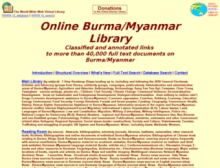Resource information
Much has been made in recent times of the continued use in Burma of antiquated and anti-human rights laws from the country's decades of military rule, as well as from the colonial era. While legislators discuss the amendment or revocation of some laws, and the issue is debated in the public domain, much less is said of the superstructure of military-introduced administrative orders that officials around the country continue to employ in their day-to-day activities, invariably in order to circumscribe or deny human rights.
Among these orders are some being used to restrict or prevent access to land of people who rightfully occupy or cultivate the land, as in the case of villagers from some 26 villages affected by the copper mining project in the Letpadaung Mountain range in Sagaing Region, on which the Asian Human Rights Commission has previously spoken (AHRC-PRL-044-2012). The AHRC has obtained copies of a series of orders issued by Zaw Moe Aung, chief administrator of Sarlingyi Township, where villagers have been fighting since mid-2012 against the expansion of copper mining in the region onto their farmlands. The orders, issued under section 144 of the Criminal Procedure Code, prohibit villagers from access to their farmlands or any form of use of the farmlands, such as for the grazing of cattle. The latest orders expired at the end of October; however, people in the region expect that they will be renewed, or that in any event they will simply be denied access to their land, which is being taken over by an army-owned company and its partner...



